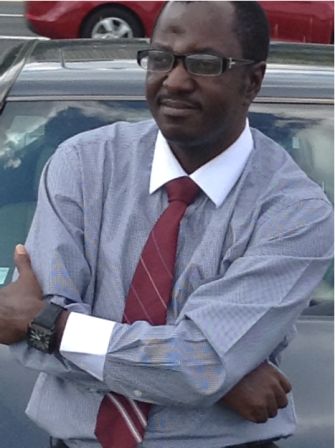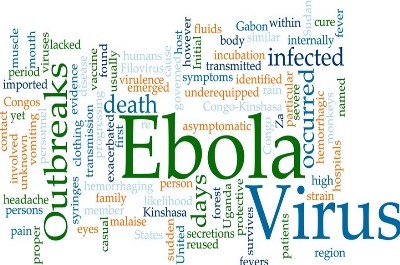The “Ebolarization” of Every Death in Sierra Leone
The magnitude and spread of the Ebola outbreak in Sierra Leone requires enormous commitment of resources and robust sustained response capacities. The unprecedented outbreak has necessitated the institution of uncomfortable measures in a bid to contain the surge in the spread of the disease. Some of the containment measures include the banning of the operations of mushroom clinics/hospitals to ensure all cases are reported to government health facilities. Another measure is discouraging burial rites undertaken by relatives without proven evidence of the Ebola status of the dead. (Photo: Alhassan Fouard Kanu, author)
Both of these measures have huge implications to authorities as well as to the wider public. Discouraging patients’ attendance in some of the mushroom health facilities, drug stores and home care by health professional is basically to minimize community exposure to the virus. However, health workers at all service delivery points are grappling with considerable fear in the handling of patients as they perceived any ill person as Ebola suspect. The perceived “Ebolarization” of every patient has negative consequences on demand creation for services. The panic-stricken public is dissuaded from frequenting health facilities even for traditional ailments such as malaria and typhoid fever; fearing that they will be treated with suspicion, and often be tagged as Ebola suspects. Often, suspected individuals are isolated whilst tests are carried out to rule out Ebola. The stigma and discrimination in such circumstances are huge to both the individuals and their families. This accounts to the patient-drought health facilities across the country, as people seek alternative health providers. Those who can ill-afford private clinics would revert to dangerous health seeking-behaviours; leading to increase mortalities.
In order to prevent or reduce high level of community exposure –through household care and customary burial procedures, every death is now considered as Ebola. Whilst relatives still have the chance of burying their dead, this will only take place after certain procedures. Firstly, the relatives must by law, inform the authority via 117 about the death.
The responsible authority, i.e. District Health Management Team (DHMT) will send a surveillance team to the home of the deceased. The team carries-out a comprehensive history-taking including travelling history and contacts of the deceased. The generated information will guide the process of ascertaining whether the death was secondary to Ebola infection.
After the surveillance (history-taking) is the collection of specimen from the body. Swabs are taken and sent to the laboratory for analysis. If the result of the test is negative of the Ebola virus, the body is then handed-over to the relatives for burial. If the result proves otherwise, the burial team will step in to firstly disinfect the room/home where the body had laid waiting for hours or days. The body will be taken by the burial team for processing and burial.
The perceived deprivation among the populace from offering a befitting burial for their loved ones is leading to fear, panic and resistance to such measures. There are occasions where burial teams have been chased away as seen recently in BlackHall Road, Freetown, Shelmingo in Bo and Masongbo in Bombali district.
Most painful to this measure is the delayed response by burial teams to attend to the bodies and/or providing Ebola status of the dead. Bodies sometimes laid waiting for days in houses and there are incidences of youths barricaded roads to push officials to collect near-decomposing bodies in their communities.
In response to these lapses, the newly appointed Minister of Health & Sanitation, Dr A.B. Fofanah has stepped in to prevent such ugly situations and above all, to ensure that the dead are treated with the respect they deserved despite their Ebola status. Just one week in post after Parliamentary Confirmation, the Hon. Minister is working tirelessly with the relevant authorities in the Western Area DHMT and has seen an increase in the number of burial teams by 100%, with the requisite vehicular support and necessary gears provided. The burial teams are deployed in zones: East, Central and West of Freetown.
Modalities are being put in place to ensure laboratory results of swabs from the deceased be made available within hours after collection.
Also being considered is the decentralization of burial sites within Freetown and its environs as only one cemetery is being used at the moment. Where cemeteries across Freetown are used, it will reduce the time of ferrying bodies from distant areas through the terrific traffic in the city to the only designated cemetery.
These measures will ensure speedy response to burials and prevent the embarrassment of bodies left in the street or decomposing in homes.
Should there be unnecessary bottlenecks within government institutions to the handling of burials; the author recommends that the task be privatized; where competent entities are given the chance to effectively managed burials within Freetown as seen in the privatization of cleaning the city by Massada. This is to prevent the government from the embarrassment of having bodies decomposing in homes or littering the streets; as this has the potential of instigating riots in communities.
The author doffs his hat for the government for the weekly risk allowances provided to the health workers and burial personnel. Health workers are encouraged to adhere to the Nightingale Pledge or Hippocratic Oath as appropriate in the care of Ebola suspects or patients and the dead. As citizens, our prayers and appreciations for those at the fore of this fight as well as adhering to the containment measures are critical to see us successfully through this herculean task of kicking Ebola out of Sierra Leone in the shortest possible time.
by Alhassan Fouard Kanu
Stay with Sierra Express Media, for your trusted place in news!
© 2014, https:. All rights reserved.






